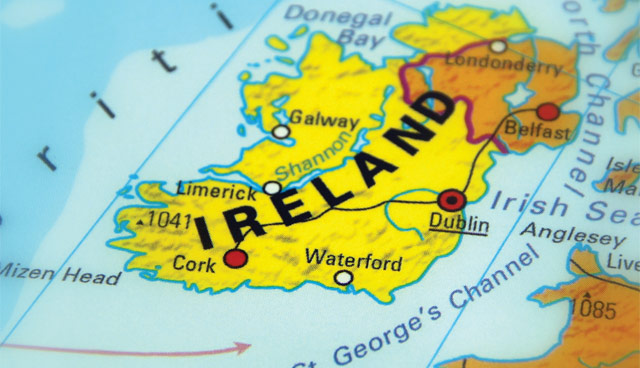We should avoid using simplistic arguments when discussing the complex issue of a border poll

The ESRI’s Seamus McGuinness and Adele Bergin outline some of the key economic considerations currently missing from the ongoing constitutional debate on the island of Ireland being spurred on by Brexit.
Brexit has elevated discussions related to the constitutional future of Northern Ireland to the centre of debate. Even without Brexit, continued demographic change in Northern Ireland make it increasingly likely that a border poll will arise in the future. Political or economic disruption as a result of Brexit may lead to this occurring sooner rather than later. However, what is currently lacking in the debate is hard evidence related to key questions that need to be answered for voters in any future border poll to make an informed decision. In a recent paper, ‘The Political Economy of a Northern Ireland Border Poll’ we began piecing together the evidence base on just some of the questions that are likely to form a key part of any future border poll debate. Some of these questions, and the existing evidence, are summarised below:
How has the economy of Northern Ireland been performing?
There is little evidence to suggest that Northern Ireland has benefited from any peace dividend. In terms of GDP per capita, Northern Ireland ranked the 10th poorest from 12 UK regions in both 2000 and 2014, with only the North-East region and Wales ranking lower. Over this period GDP per capita grew by just 7 per cent in Northern Ireland, compared to 30 per cent in the Southern and Eastern region of the Republic of Ireland, which contains around three quarters of the country’s population. The gap in real per capita incomes between Northern Ireland and the Southern and Eastern region of Ireland was approximately €25,000 in 2014. We find the gap in incomes between Northern Ireland and leading regions in both Great Britain and the Republic has been widening over time and there is little evidence to suggest that this trend will not continue.
What are the causes of Northern Ireland’s poor relative performance?
We argue that Northern Ireland’s poor performance, relative to that of the Republic of Ireland, is due to low levels of productivity that are likely to be driven by a number of key factors including a widening gap in educational attainment, lower intensity and poorer quality FDI, and lower levels of export orientation among both manufacturing and service sector companies. Northern Ireland’s poor performance in these areas also points to a lack of effective UK regional policy and, related to this, insufficient funding in key areas under the various devolved administrations.
Over what period would the process of unification take place?
Many of the assessments of the cost of unification appear to assume that unification will occur immediately following any border poll result in favour of unification, with all the associated costs of administering Northern Ireland immediately transferring to the Republic. Such a scenario would be highly risky and unmanageable, both politically and economically, and it is both advisable and likely that any unification process will require a substantial transition period. So how long might any transition period last? Looking at some recent constitutional upheavals involving the UK, while the transfer of sovereignty of Hong Kong from the UK to China in 1997 occurred 13 years following the signing of the Sino-British Joint Declaration, the planned transition period for Brexit was just two years. A transition period should also involve the introduction of new education, regional and industrial policies aimed at increasing productivity levels in Northern Ireland and reducing the eventual cost of unification. Furthermore, presuming that the UK has left the EU by that stage, Irish re-unification will also involve the North re-entering the EU, which opens the possibility of EU involvement in the transition process.
What is the likely cost of unification to the Irish tax payer?
Another factor relates to negotiations on debt and assets that are attributable to Northern Ireland. In terms of citizens in the Republic, a central concern will be the additional cost of running Northern Ireland under unification. The level of subvention, which refers to the gap between government spending and tax revenues in Northern Ireland, is often focused on as a measure of this cost. Subvention in 2014 was £9.16 billion. However, when items of expenditure not directly related to the running of Northern Ireland are subtracted, for example, its contribution to UK defence spending or UK government debt, potential subvention levels could fall by around 25 per cent. The level falls further when account is taken of UK public sector pensions and contribution based old age pensions, both of which would remain a UK liability post-unification. Nevertheless, it is Northern Ireland’s low productivity levels that create a need for subvention payments in the first place, and the ultimate cost (or benefit) to the Irish tax payer will depend on the success of policy reforms aimed at addressing this problem.
Will the loss of the NHS be costly to Northern Ireland citizens?
Our analysis suggests that the gap between the Irish and UK health systems has narrowed, presumably as a consequence of much higher levels of per capita health expenditure in the Republic and the impacts of austerity policies in the UK. According to OECD data, in 2017 per capita health spending (PPP adjusted) was €3,930 in Ireland and €3,045 in the UK. The Irish system does have more up-front charges compared to the NHS; however, it also contains balances to ensure that healthcare remains free at the point of use for the most vulnerable in society. By international standards, both health systems have an unacceptably high acute bed occupancy rates, which results in an inability to cope with variations in levels of patient demand and points towards failures in the social care systems of both jurisdictions.
Concluding comments
A border poll appears increasingly likely at some point. It is important that any debate on this vital issue is accompanied by facts, so that voters can be appropriately informed. There is little to be achieved through a static analysis of Irish unification whereby the current costs of administering Northern Ireland, which are themselves debatable, are simply superimposed on the current tax and welfare systems of the Republic. Such a scenario would never seriously be proposed, or ratified, in any border poll. Responsible debate on the economics of Irish unification should be based around the facts that have been established through research that fully accounts for the likely dynamics associated with any unification process. What we must avoid at all costs is a repeat of the UK Brexit referendum, which is best characterised as a scenario of spurious claims and counterclaims that led, ultimately, to sustained political stalemate.
Dr Seamus McGuinness is a Research Professor at the Economic & Social Research Institute, Dublin and Dr Adele Bergin is a Senior Research Officer at the ESRI.





